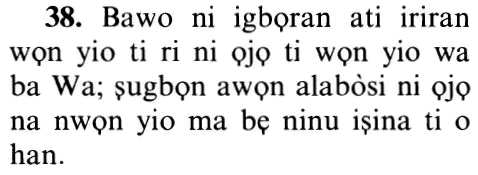19vs38
Select any filter and click on Go! to see results
أَسْمِعْ بِهِمْ وَأَبْصِرْ يَوْمَ يَأْتُونَنَا لَكِنِ الظَّالِمُونَ الْيَوْمَ فِي ضَلَالٍ مُّبِينٍ
AsmiAA bihim waabsir yawma yatoonana lakini alththalimoona alyawma fee dalalin mubeenin
Index Terms
Click to play
Yoruba Translation

Hausa Translation
Mħne ne ya yi jinsu,(6) kuma mħne ne ya yi ganinsu a rãnar da suke zo Mana! Amma azzãlumai sunã a cikin ɓata bayyananna.
Asbabu n-Nuzuul (Occasions of Revelation)
The Disbeliever's warning of the Day of Distress
Allah, the Exalted, says informing about the disbelievers on the Day of Resurrection that they will be made to have the clearest hearing and sight. This is as Allah says,
وَلَوْ تَرَى إِذِ الْمُجْرِمُونَ نَاكِسُواْ رُءُوسِهِمْ عِندَ رَبِّهِمْ رَبَّنَآ أَبْصَرْنَا وَسَمِعْنَا
And if you only could see when the criminals hang their heads before their Lord (saying): "Our Lord! We have now seen and heard.'' (32:12)
They will say that when it will not benefit them, nor will it be of any use to them. If they had used these senses properly before seeing the torment, then it would have brought them some benefit and saved them from the Allah's punishment.
This is why Allah says,
أَسْمِعْ بِهِمْ وَأَبْصِرْ ...
How clearly will they (disbelievers) see and hear,
This means that no one will hear and see better than they will.
... يَوْمَ يَأْتُونَنَا ...
the day when they will appear before Us.
The Day of Resurrection.
... لَكِنِ الظَّالِمُونَ الْيَوْمَ ...
But the wrongdoers today are...
now, in the life of this world,
... فِي ضَلَالٍ مُّبِينٍ ﴿٣٨﴾
...in plain error.
They do not hear, see or think. When they are requested to follow guidance, they are not guided and they succumb to those things that do not benefit them.
Then, Allah says,
يقول تعالى مخبرا عن الكفار يوم القيامة إنهم يكونون أسمع شيء وأبصره كما قال تعالى " ولو ترى إذ المجرمون ناكسو رءوسهم عند ربهم ربنا أبصرنا وسمعنا " الآية أي يقولون ذلك حين لا ينفعهم ولا يجدي عنهم شيئا ولو كان هذا قبل معاينة العذاب لكان نافعا لهم ومنقذا من عذاب الله ولهذا قال " أسمع بهم وأبصر " أي ما أسمعهم وأبصرهم " يوم يأتوننا " يعني يوم القيامة " لكن الظالمون اليوم " أي في الدنيا " في ضلال مبين " أي لا يسمعون ولا يبصرون ولا يعقلون فحيث يطلب منهم الهدى لا يهتدون ويكونون مطيعين حيث لا ينفعهم ذلك .
"أسمع بهم وأبصر" بهم صيغتا تعجب بمعنى ما أسمعهم وما أبصرهم "يوم يأتوننا" في الآخرة "لكن الظالمون" من إقامة الظاهر مقام المضمر "اليوم" أي : في الدنيا "في ضلال مبين" أي بين به صموا عن سماع الحق وعموا عن إبصاره أي : اعجب منهم يا مخاطب في سمعهم وإبصارهم في الآخرة بعد أن كانوا في الدنيا صما عميا
قال أبو العباس : العرب تقول هذا في موضع التعجب ; فتقول أسمع بزيد وأبصر بزيد أي ما أسمعه وأبصره . قال : فمعناه أنه عجب نبيه منهم . قال الكلبي : لا أحد أسمع يوم القيامة ولا أبصر , حين يقول الله تبارك وتعالى لعيسى : ( أأنت قلت للناس اتخذوني وأمي إلهين من دون الله ) [ المائدة : 116 ] . وقيل : " أسمع " بمعنى الطاعة ; أي ما أطوعهم لله في ذلك اليوم
I'raab - grammatical analysis of the Qur'an
«أَسْمِعْ» ماض جاء على صيغة الأمر والجملة مستأنفة «بِهِمْ» الباء حرف جر زائد زيدت في الفاعل وجاء ضميره ضمير نصب لمناسبة الباء «وَأَبْصِرْ» معطوف على أسمع وإعرابه مثله «يَوْمَ» ظرف زمان «يَأْتُونَنا» مضارع مرفوع بثبوت النون والواو فاعل ونا مفعول به «لكِنِ» مخففة من لكن لا عمل لها «الظَّالِمُونَ» مبتدأ مرفوع بالواو لأنه جمع مذكر سالم «الْيَوْمَ» ظرف زمان «فِي ضَلالٍ» متعلقان بالخبر المحذوف «مُبِينٍ» صفة والجملة مستأنفة
